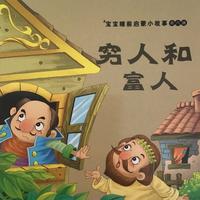穷人 和 宜人
бедные||приятный
||riche
poor people|with|pleasant
pobre|e|agradável
der Arme||angenehm
가난한 사람|와|적합한 사람
||agradable
arm und angenehm
poor and pleasant
Pobre y deseable
Pauvre et souhaitable
Poveri e desiderabili
貧しくて楽しい
불쌍하고 바람직한
Slecht en wenselijk
pobre e agradável
Плохое и желаемое
Dålig och önskvärd
上帝 来到 人间 , 决定 找户 人家 借宿 。
||на земле|решение|найти дом|семья|остановиться
||||找户(1)||loger
God|came|the human world|decided|找一个家|a family|to stay overnight
Deus|came|mundo humano|decide|find a home|人家 família|hospedar-se
Gott||Welt||eine Unterkunft||übernachten
하느님|도착하다|인간 세상|결정하다|가정을 찾다|가정|하룻밤 묵다
||||buscar una casa||quedarse
Gott kam auf die Welt und beschloss, eine Familie zu finden, um dort zu übernachten.
God came to earth and decided to find a family to stay with.
神はこの世に来られ、眠る家族を見つけることを決心しました。
하나님은 이 땅에 오셔서 함께 지낼 가족을 찾기로 결정하셨습니다.
Deus veio ao mundo e decidiu encontrar uma família para passar a noite.
一个 富人 见 上帝 衣着 朴素 , 不像 有钱人 , 就 找 理由 拒绝 了 。
|богатый|||одежда|простой|не как|rich person|||||
a|rich person|saw|God|clothing|simple|not like|rich person|then|found|reason|refuse|
|||||||pessoa rica|||||
||||kleiden|einfach||Reiche Leute|||||
|부자|만나다|신 하나님|옷차림|소박한|같지 않다|부자|그냥|찾다|이유로|거절했다|
||||vestido|sencillo|like|los ricos|||||
Als ein reicher Mann sah, dass Gott im Gegensatz zu einem reichen Mann in Zivil gekleidet war, fand er Gründe, dies abzulehnen.
A wealthy man saw God dressed plainly, unlike a rich person, and found an excuse to refuse.
金持ちは、金持ちとは異なり、神が私服を着ているのを見ると、断る理由を見つけます。
그리고 한 부자는 하나님이 소박한 옷을 입고 부자처럼 보이지 않는 것을보고 그를 거절 할 이유를 찾았습니다.
Um rico viu Deus vestido de maneira simples, não como os milionários, então encontrou uma razão para recusar.
上帝 来到 穷人家 , 受到 了 热情 招待 。
||бедная семья||||
||maison de pauvres||||
God||the poor family|received||warm reception|reception
|||||recepção|
||Arme Leute||||
|왔다|가난한 집|받다||열정적인 환대|환대
||la casa de los pobres||||hospitalidad
Gott kam zum Armenhaus und wurde herzlich bewirtet.
God came to a poor family and was warmly welcomed.
神は貧しい家に来られ、温かく迎えられました。
Deus foi à casa de um pobre e recebeu uma calorosa recepção.
上帝 决定 满足 他们 三个 愿望 。
||удовлетворить|||
||erfüllen|sie||
God|decided|to fulfill|them|three|wishes
||||três|desejos
||||tres|
Gott beschloss, ihre drei Wünsche zu erfüllen.
God decided to fulfill their three wishes.
神は彼らの3つの願いを叶えることにしました。
신은 세 가지 소원을 들어주기로 결정했습니다.
Deus decidiu atender aos três desejos deles.
富人 知道 后 , 忙 骑马 追赶 上帝 , 借着 忏悔 也 想 提出 三个 愿望 。
|||| horseback|догнать||借助||||выдвинуть||
||||||||repentance|||||
rich person|knows|after|busily|riding a horse|chase|God|by|repentance|also|want|put forward|three wishes|wishes
|||||||através de||||fazer||
|||||verfolgen||durch|Reue|||||Wünsche
||||montar a caballo|alcanzar a||a través de|confesión|||||
Nachdem die Reichen davon erfuhren, eilten sie zu Pferd, um Gott zu jagen und wollten aus Reue auch drei Wünsche äußern.
When the rich man realized this, he hurried after God on horseback and tried to make three wishes through repentance.
金持ちはそれを知った後、急いで馬に乗って神様を追いかけ、悔い改めながら三つの願い事をしたいと思いました。
Depois que o homem rico descobriu, ele correu atrás de Deus a cavalo e quis fazer três desejos por meio do arrependimento.
可 马 不听使唤 , 他 说 了 些 气话 , 马 竞 倒地 身亡 了 。
|||||||paroles de colère||a|||
||nicht gehorchen|||||Worte aus Ärger|||gestürzt|gestorben|
can|horse|not obedient||said|||angry words||actually|fell to the ground|died|
||não obedece|||||||竟|caiu|morreu|
|caballo|no obedeció|||||palabras de enojo||竟然|se cayó|muerte|
Aber Ma hörte nicht zu, er sagte etwas Wütendes, und Ma Jing fiel zu Boden und starb.
But the horse wouldn't listen to him. He said something in anger, and the horse fell down and died.
しかし、マは従わなかった、彼はいくつかの怒った言葉を言った、そしてアトレティコは地面に倒れて死んだ。
Mas o cavalo não ouviu, disse algumas palavras raivosas, e o Atlético caiu no chão e morreu.
他 让 妻子 坐在 马鞍 上 , 妻子 竟然 下不来 了 。
|||сидеть на|седло|||actually|не может слезть|
|||||||en fait|ne peut pas descendre|
|let|wife|sit on|saddle||wife|actually|couldn't get down|
||||sela||||não consegue descer|
||||||||konnte nicht herunterkommen|
||||silla de montar||||no puede bajar|
Er ließ seine Frau im Sattel sitzen, aber sie konnte nicht absteigen.
He put his wife in the saddle, and she couldn't get out of the saddle.
彼は妻をサドルに座らせたが、彼女は降りることができなかった。
Ele colocou a esposa na sela, mas ela não conseguiu descer.
富人 垂头丧气 , 不仅 什么 都 没 得到 , 反而 失去 了 一匹 马 。
|подавленный|не только|||||наоборот|||одна лошадь|
|abattu||||||||||
|dejected|not only|anything|||got|instead|lost||one horse|
||||||||||uma|
|niedergeschlagen||||||||||
|||||||오히려|잃다||한 필|말
|deprimido|||||||||un caballo|
Der reiche Mann war niedergeschlagen, und anstatt nichts zu bekommen, verlor er ein Pferd.
The rich man was dejected, and instead of getting nothing, he lost a horse.
金持ちはがっかりしました。何も手に入れられなかっただけでなく、馬を失いました。
O homem rico ficou abatido, não só não ganhou nada, mas perdeu um cavalo.

